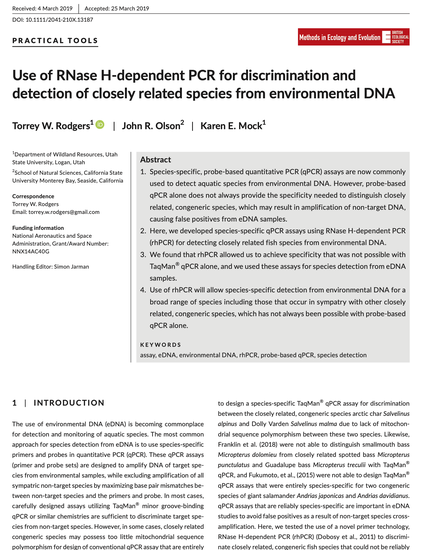
Article
Use of RNase H-dependent PCR for discrimination and detection of closely related species from environmental DNA
Methods in Ecology and Evolution
(2019)
Abstract
- Species-specific, probe-based quantitative PCR (qPCR) assays are now commonly used to detect aquatic species from environmental DNA. However, probe-based qPCR alone does not always provide the specificity needed to distinguish closely related, congeneric species, which may result in amplification of non-target DNA, causing false positives from eDNA samples.
- Here, we developed species-specific qPCR assays using RNase H-dependent PCR (rhPCR) for detecting closely related fish species from environmental DNA.
- We found that rhPCR allowed us to achieve specificity that was not possible with TaqMan® qPCR alone, and we used these assays for species detection from eDNA samples.
- Use of rhPCR will allow species-specific detection from environmental DNA for a broad range of species including those that occur in sympatry with other closely related, congeneric species, which has not always been possible with probe-based qPCR alone.
Disciplines
Publication Date
2019
DOI
https://doi.org/10.1111/2041-210X.13187
Citation Information
Karen E. Mock. "Use of RNase H-dependent PCR for discrimination and detection of closely related species from environmental DNA" Methods in Ecology and Evolution Vol. 10 Iss. 7 (2019) p. 1091 - 1096 Available at: http://works.bepress.com/karen_mock/223/
